
The leader of the pack, with tattoo work by Richard Sevilla of Exotic Tattoo Molina, shot on location in Murcia, Spain. Well, alright.
See more in “Miscellaneous Tattoos“ (Tattoos)

The leader of the pack, with tattoo work by Richard Sevilla of Exotic Tattoo Molina, shot on location in Murcia, Spain. Well, alright.
See more in “Miscellaneous Tattoos“ (Tattoos)
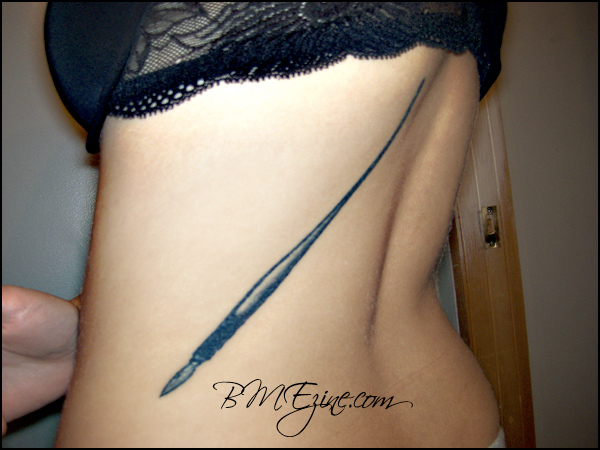
The above tattoo is of a “pen,” which is an ancient writing utensil that was used millions of years ago, until the Internet was invented, which everyone pretty much loved right away, forever, the end.
OR DID THEY? America’s longest-running game show, BME’s Big Question, returns for its first edition of 2009 with our esteemed panel discussing the Internet: The positive and negative effects it’s had on the body modification industry, what life was like before it was around, and more. Big thanks to all involved!
To read BME’s Big Question #5: The Series of Tubes, click here.
[Ed. note: Comments on this post have been disabled. Mash your keyboards in the forum attached to the post. Thanks.]
Welcome to BME’s Big Question! In this feature, we’re going to ask a handful of the community’s best and brightest piercers, tattooists, heavy mod practitioners and shop owners for their opinion on one question or issue that’s affecting the body modification community. Many, many thanks to all of the contributors.
If you’d like to be a part of future editions, or if you have an idea for an issue or question you’d like to see addressed, please e-mail me.
This week’s topic:
If you were working prior to body modification’s rise on the Internet, how did you adapt to its emergence? If you came around afterward, how large a role did the Internet play when you were becoming established in your field? And for everyone, what are the positives and negatives of having the Internet available, whether as a tool for research, marketing, or communication? Where do you think the industry would be without it?
* * *
 |
When I first started piercing, I wasn’t aware of any type of body modification community online. Without that online community, I took everything the person who was teaching me to pierce to be truth. What he said was how it was done, and I had no reason to think otherwise. I later found out about BME and IAM. Through BME, I found that there were many things that we were doing that weren’t really the best way to do things. Talking to other piercers online made me a better piercer, helped me improve myself and the studio I was working in.
Now there is so much information out there and so many great piercers, and body jewelry manufacturers online (just on this site alone) that it really irritates me when I see someone doing things half-assed. When I was starting out, you really had to search for information, now it’s right there ready for you to take, but a lot of the new piercers just aren’t taking it. |
 |
I see the availability of information to be a good thing. It’s not a matter of the information, or its availability, having a negative impact … it’s what people do (or don’t do) that is positive or negative.
As John pointed out however, it does make it extra frustrating when you see people doing things that make no sense at all. The information about various options is so readily available, there is really no excuse (other than laziness or just not caring) for doing things grossly below par. Maybe I’m just being nostalgic and romanticizing things, but I do think there is something to be said for the effort you had to put into finding information before the Internet was around. You had to go out of your way to find books or magazines, you had to actually pick up the phone and call someone or go hang out with them. It required a greater commitment of time and energy from everybody involved. I think one benefit of the information being less accessible was that it forced people to do more critical thinking about their procedures; especially if it wasn’t a traditional procedure. Instead of hopping on BME or YouTube and seeing pictures/videos of procedures being done, you had to think through the process step-by-step and you had to evaluate what your different options were. You often didn’t have a “right way” to fall back on; you just had the way that made the most sense to you. And that way would likely change as you became more skilled/experienced. Many younger piercers I deal with these days simply want to know how they are “supposed” to do it. They are often reluctant to consider various options and they just want to know what’s “right and wrong.” |
 |
When I started piercing I remember having to scrounge for any information I could get about piercing. I picked up Grey’s Anatomy and dog-eared all the pages on the ear, face, nipple, etc. It was much more of a challenge finding any useable information. The internet has made it so easy for any idiot to watch some other idiot do a horrible piercing on a third idiot. The Internet is great at helping good piercers become better piercers. But I think it’s used more frequently to turn bored people with no career into shitty piercers.
I grew into the Internet really slowly. I used to have this research folder full of any old article I could come across in print or online. I had to track down bits and pieces over months and years. By the time the Internet really started to trickle out the professional-level information I was already fairly established so I really just used it to learn other people’s little tricks of the trade. I’m glad that I had to work for it in the real world instead of just pulling all the info down off the Web. I think my professional opinion is that I dislike almost everything about the Internet’s marriage to this industry, minus the publicity aspect, but at least it’s evolution. It started off as a community of professionals sharing information with people they felt comfortable with. There’s no barrier of good judgment or apprehension anymore, it’s all just public domain. I liked it more when people kept secrets and you had to work for it. |
 |
Oh man … I know what you’re talking about. The first day of my apprenticeship I was handed folders, and binders, full of random information. I was given an old Gauntlet seminar hand book, interviews with Keith Alexander, Fakir, Jon Cobb, the Modern Primitives Book, all kinds of things.
And when I started apprenticing Shelly, I did the same thing. I gave her all kinds of information and said, “Read all of this and then find your own.” I think it’s important for people coming into this industry to do their own research and not just look to a forum and say, “Hey, how do you do this?” without doing any of their own digging first. We’re always learning and always changing our techniques, so if we can get our apprentices to do their own research right from the start it will keep them being proactive throughout their careers. |
 |
I started my own notebook of everything the guy teaching me said. A lot of that helped give me a point of reference as I continued to learn. When I was just cutting my teeth, Ask.BME was something I read often.
I still feel I’m many levels below everyone else on this panel. Hell, I read the writings of more than a couple of you years back. I think I found my way onto BME just after I began my apprenticeship and it’s been an invaluable communication and education tool ever since. In terms of a glut of availabile information, I certainly echo the displeasure of being able to watch kids sticking each other with needles on the school yard. Not that I think experimentation in youth is a bad thing, I’m sure we’ve all been there. But seeing something on a video through the Internet often lends an air of credibility to the experimentation, allowing others to follow in line. I remember one afternoon, less than six months of learning in, one of the regulars from the shop brought in a stack of old PFIQs — I thought I had hit the jackpot. Now, being able to pull up any amount of varied articles at any time, it’s certainly easier, but the thrill of the hunt has diminished … |
 |
When I first started my “apprenticeship,” I was given the “Pierce With a Pro” VHS tapes, the “Hole Story” VHS tapes, a pile of old PFIQ magazines, and was told to read and watch.
There was no easily accessible info to be found online really at that point, as BME was still in its earliest stages. I have to agree totally with the above statement, While I DO think that there is some GREAT info available online, and I see the Internet as a great resource for piercers and other mod artists, I also feel that it contributes to the the over-saturation of idiots in our industry. Perfect case in point: Me to a client: How did you end up with such a horrible piercing? Client to me: Well, my friend and I watched this video on how to pierce your own *fill in the blank* on YouTube… And yes, while these YouTube-trained home piercers are not technically a part of our industry, they are putting out piercings. They are perpetuating the idea that piercing is ugly, full of risk, and a delinquent behavior. The videos are also, for the most part, scary to watch, and I get a ton of clients now that are more terrified than ever after watching them! I just feel that, like anything, the Internet as a tool for us is both positive and negative. It has its high points. I mean, how else could projects like this be possible? But it has its low points. There is a greater amount of information available to those seeking it, which can be wonderful when that information is put into the right hands, but really, how often have we all cringed when we’ve seen the results of that put into the WRONG hands? |
 |
In 1979, my father purchased a dual floppy, wooden cased, DOS-based computer called the NorthStar Horizon. With no hard drive, a giant dot matrix printer and a tiny monochrome screen, this magical machine could run the tax software for his CPA firm, making the tedious task of written double-entry book-keeping obsolete. Although the device is now just gathering dust in my garage, at the time it was a tool that allowed his business to grow dramatically without needing to hire more accountants.
Jumping forward a few years … I started piercing in 1992, the World Wide Web didn’t exist and the only comprehensive online resource was the rec.arts.bodyart newsgroup. Yes, there were plenty of photos changing hands in those days, but the random body modification you might see was simply the byproduct of downloading porn. Yes, porn was passed around before the WWW. Crazy, huh? Sites like BME and SPC didn’t exist and the body modification community was inspired by images in printed materials, most notably Modern Primitives, of which many careers including mine got their start. Back in those days I know the desire for body modification existed, but without the Internet to expose the masses, it remained an obscure art form. It was the practitioners that appeared in the late ‘80s and early ‘90s that were the first generation to really cut their teeth simultaneously as the Internet began its influence. Some embraced the new technology and their careers grew and thrived. Others tried and ultimately floundered in the wake of the World Wide Web’s massive and sudden overexposure. Then a third group of modders either missed the boat altogether or purposely avoided the Internet, and who can blame them? For every positive thing posted there seems to be numerous negative and often hateful responses, especially in those days. Remember the days of film cameras and scanners? Back then people had to take pictures, have them developed and scan them before they could ever be uploaded to the web. It was a time when Paul King was the MTV poster boy for navel piercings, and practitioners were changing from simple craftsmen to rock stars almost overnight. Tattooers may have earned that stature before the rest of us, but the Internet definitely played a key role in helping everyone working in the body modification industry to reach a new level of fame. Back then if you put a ring in your friend’s penis using a safety pin, you might have been viewed as a hack, but take a picture and put in on the web and you were a pioneer and an innovator, and it didn’t stop there. One ring in a penis? How about two? Three? Heck, why not cut it in half? Half, shit, cut it off! Now before the age-old debate of how far is too far begins, I will step back and say this: People are going to do what they want. Do photos on the Internet shape the viewer? To an extent, sure. Do these same images inspire people to reach for the next level? Yes, of course, but don’t blame the Web for people’s stupidity and poor choices. It’s like blaming rock music for murder. Giving someone an idea is far different than forcing their hand. The Internet is a tool, nothing more. A very complex, multifaceted and often entertaining tool … but still just a tool, one that the body modification community uses more effectively than any other hands-on trade. Maybe it’s the fact that our industry blurs the line between craft and entertainment. In a sense we hit the reality crazy before the TV ever did. Want see the strange and bizarre? You can program your TiVo to find the shows or you can just turn on your computer. So here we are, the subject of constant controversy from both inside and outside our ranks. The male ear piercings we found so shocking the ‘70s hardly raise an eyebrow anymore. Will two-inch lobes and facial tattoos be viewed the same way in 30 years? Who can say? There’s no doubt the Internet has helped body modification to thrive. Would television, film and print media have had the same effect? Probably not, but our growth may have been more controlled. Research would have trickled down slower. International communication would have been difficult at best. Marketing and exposure? Really I have no clue. If there is nothing else I’ve learned over the years it’s that technology is ever changing. No matter what the field, all industries must learn to adapt and use what is available to the fullest if they hope to survive. |
 |
The first shop I worked in used to play the “Pierce with a Pro” VHS tapes in the waiting area. I hated it, but the boss thought it would be good for clients to see what they would be going through beforehand. We used to get this kid who would come in just to watch these videos. Then, guess what? About three months later that kid was piercing at a studio down the street. That was all the research he did. He continued to be a hack for a few years after, before disappearing.
And I agree with Allen that you can’t “blame the web for people’s stupidity and poor choices.” Remember when that picture of the stretched-up Achilles heel piercing was on ModBlog? I thought that was fantastic. It’s amazing to me what the human body is capable of and that there weren’t serious complications from that. I loved that it was on ModBlog because otherwise I would have never gotten to see it. Does that mean I’m going to offer Achilles piercings? No fucking way!!! People need to have some common sense, and take responsibility for themselves. With the lack of hands on research and initiative, people also seem to be losing professional morals and ethics. |
 |
You know what’s funny? We were all hacks once, especially the old timers. My training came from a one day course by Fakir. This was before his school, and I was his second student after Erik Dakota.
So in a sense I was one of those hacks that knew very little and just set up shop. In a way I’m kind of glad I did it that way. Because I didn’t have any formal training, I had to work twice as hard to both learn and prove myself. |
 |
Right, but you worked hard to learn and improve. People seem to be losing that motivation. Almost 12 years later, I’m still working hard and improving. There are all these piercers now that think they have it all figured out, they are masters of their craft. I just don’t understand that mentality.
|
 |
“Because I didn’t have any formal training, I had to work twice as hard to both learn and prove myself.”
Hear, hear. The kids that think they are master piercers, so to speak, after piercing for a year KILL me. There has been nothing earned, no sacrifices made. |
What do you think? Let’s hear it in the comments.
Please consider buying a membership to BME so we can continue bringing you articles like this one.
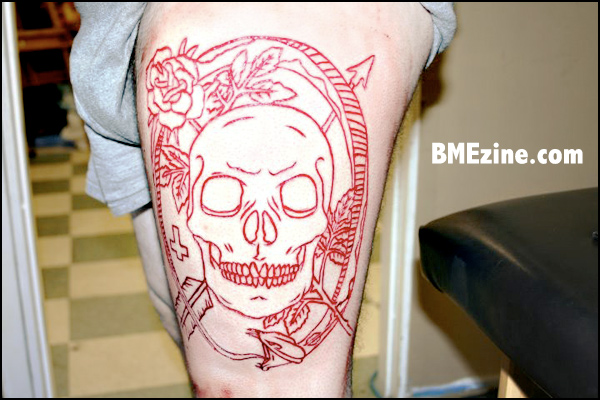
Charles Finnie from Eye of the Lotus in Edmonton, Alberta, checks in with this Mike Giant–inspired cutting on Ian. Fun fact: You know what inspired Mike Giant? A skeleton.*
*May not in any way be true, but it seems reasonable, right?
See more in “Misc. Cuttings“ (Scarification)
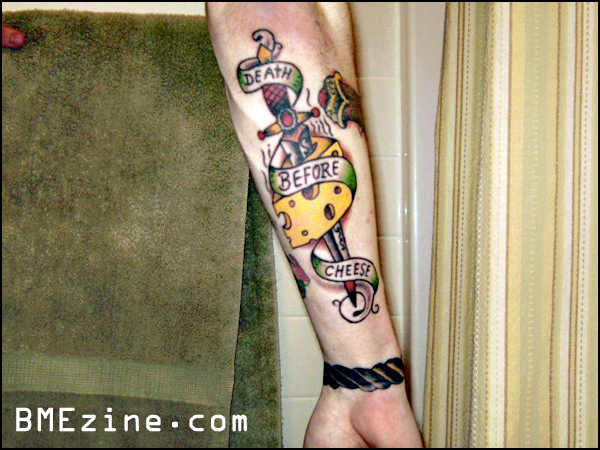
So, this treasonous tattoo can be found on Mandic, who is NOT EVEN LACTOSE INTOLERANT, but claims he is just a picky eater and despises God’s cheese, so much so that he will peel it off of slices of pizza before he eats them, because he finds it “disgusting.” Listen comrade, I’m sure you’re emboldened by the new President’s mandate that America will be inclusive of all people — even non-believers! — but piling cheese on top of every damned thing you eat is as American as a delicious slice of apple pie, with melted cheese. I don’t know where you get off exercising personal taste and trying to keep your arteries unclogged and other “healthy” courses of dietary action, but quit it.
(Actually, you’re probably right. Tattoo by Frankie G. at Tattoo Marks in Souderton, Pennsylvania.)
See more in “Old School (and Old) Tattoos“ (Tattoos)
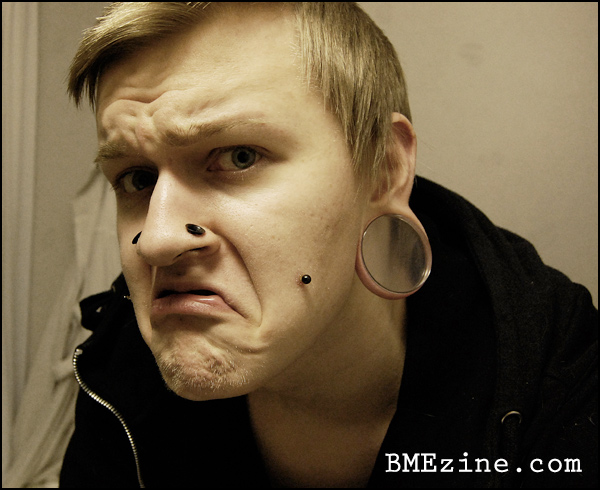
Pop quiz! This gentleman is:
A) Relieving himself
B) Doing a Robert De Niro impression
C) Stumbling across a dead body in his kitchen
For the answer, look into your hearts, friends. You’ll find it.
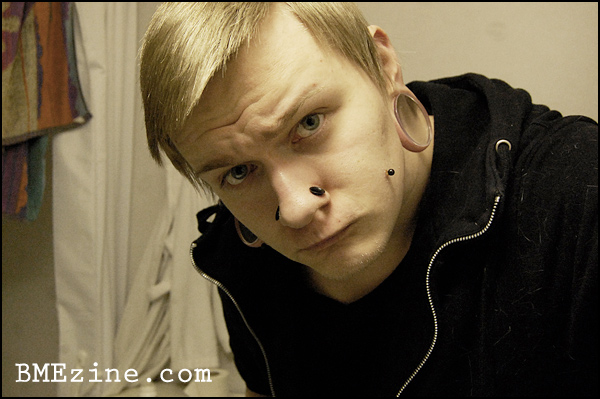
See more in “Ear Stretching (past 1/2″)“ (Ear Piercing)
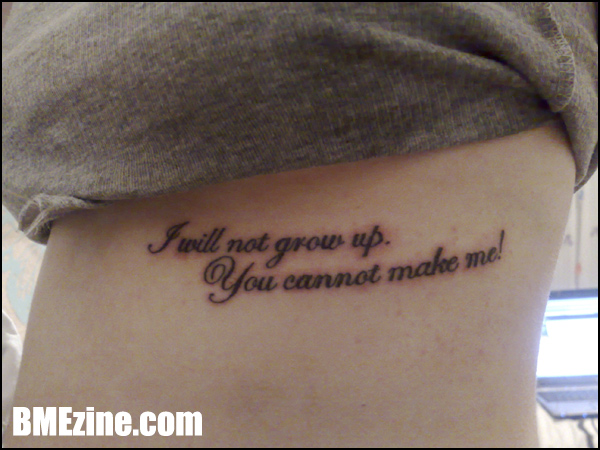
Oh no?
[restrains tattooee, gives her a desk job, two kids and a mortgage]
You were wrong to challenge me.
(Tattoo by Costa Dan at King Arthurs Tattoo Studio in Scarborough, UK.)
See more in “Lettering Tattoos“ (Tattoos)
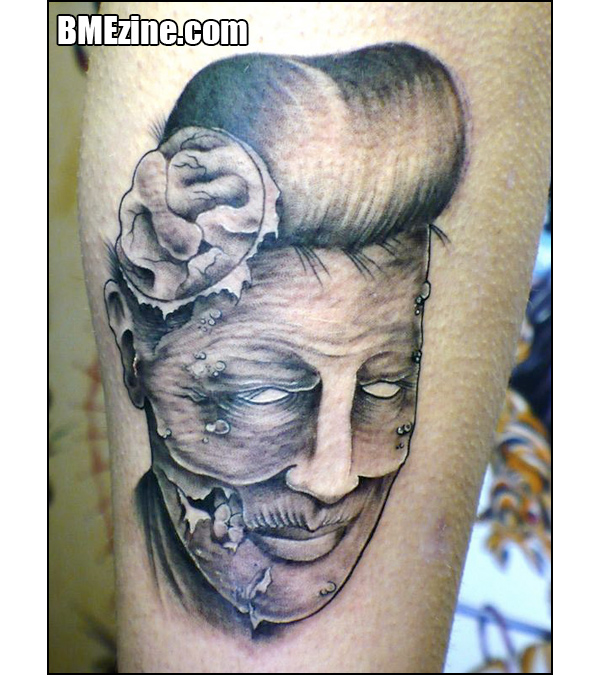
Meltbanana sends in this photo of her new “Zombie Elvis” tattoo. It’s a very well done piece, so I mean absolutely no disrespect whatsoever, but I had no idea Zombie Elvis looks so much like alive David Lynch. That’s good, though, because I wasn’t planning on sleeping for the next 50 years anyway.
(Tattoo by Marco Lari at Quetzal Tattoo in Milan, Italy.)
See more in “Sci-Fi Tattoos“ (Tattoos)

Tim Gunn checks in:
“So, Caralena, what have you got for us? Oh MY! I think that leopard-print headband is really daring, let me just say. And surrounding those lovely blue eyes with dark colors is doing it for me. It is. Oh, and juxtaposing the blues of your eyes with the bright pink beads on your surface piercing? You have made it work, my friend.”
Thanks, Tim!
(Legendary Pink Dots anti-eyebrow/surface piercing by the folks at Skullfly Tattoo and Piercing in Eugene, Oregon.)
See more in “Facial Surface Piercing“ (Surface & Unusual Piercing)
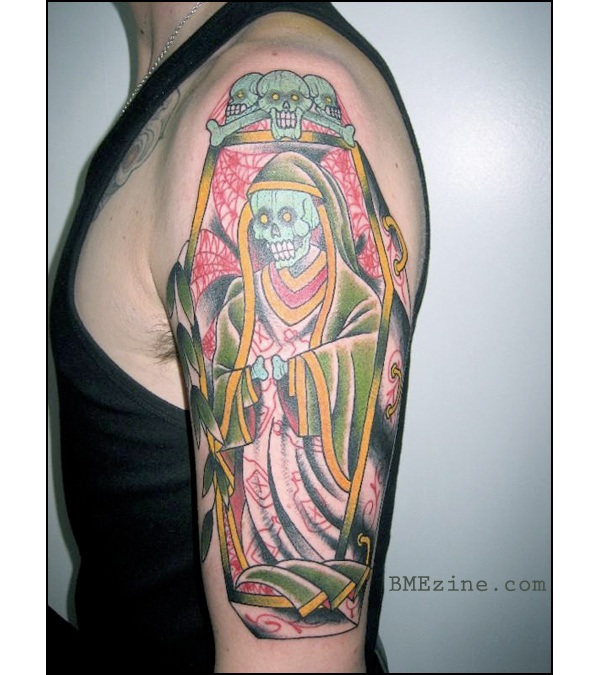
Calling in sick to church? No sweat. You can explain that to Guadalupe de los Muertos up there.
(Tattoo on El Bigote by Xico at Forevermore Tattoos in Shepherd’s Bush, London, England.)
See more in “Old School (and Old) Tattoos“ (Tattoos)